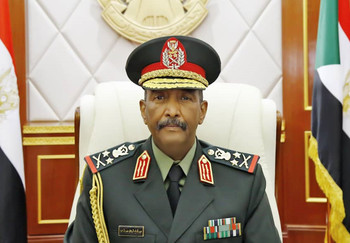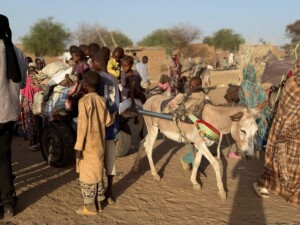El Burhan calls for inclusivity in Sudan’s political negotiations

Chairman of Sudan’s Sovereignty Council and Commander of the Sudan Armed Forces Lt Gen Abdelfattah El Burhan (File photo: SUNA)
The head of Sudan’s Sovereignty Council, Lt Gen Abdelfattah El Burhan, warned that exclusion, minimising the role of others, not listening to their demands, and imposing the will of specific groups will lead to wasting the current opportunity, and will put the unity and security of the country in great danger.
In a speech on the occasion of the anniversary of Sudan’s Independence (January 1, 1956), he said, “We look forward to broadening the base of political consensus in preparation for discussing and resolving the core issues identified by the framework agreement.”
He renewed the military institution’s commitment to the final exit from the political process and the protection of the transition, and expressed his hope that the transitional government would be formed from independent national competencies. He stressed the importance of focusing the government’s basic programs on the economy, peace, and security, and preparing for the elections.
The Forces for Freedom and Change (FFC) say that the workshops and conferences on the five deferred issues will start simultaneously on January 9.
Jaafar Hassan, spokesman for the FFC, said in a workshop organised by the Nilein University professors’ initiative on the framework agreement on Saturday that they refuse to drown the political process, stressing that the agreement is limited to agreed-upon parties and is not open to all.
He explained that the resistance committees are not required to support the framework agreement in order to avoid division, indicating that the unity of the committees towards rejecting the framework agreement is better than their division between supporters and opponents.
He said that the framework agreement would become a dead letter in the event that the civil front did not cohesion. He pointed out that there is no clear vision of the Legislative Council.
Challenges facing the agreement
Fadlallah Burmah Nasser, the designated head of the National Umma Party, confirmed that the framework agreement faces great challenges.
During his address to a symposium at EL Nilein University, he called on the signatories to the framework agreement to open the hearts and minds of all those who did not sign. He also called on the non-signatories to catch up with the agreement, calling for moving away from personal and partisan interests.
He warned of the dangers of the conflicts taking place in various parts of the country, which he said threaten the country’s identity and may lead to its fragmentation. He also warned of the dire consequences of the spread of hate speech.
He warned of the dire consequences of disagreements among the civil parties, and within the military forces.
Jibril Ibrahim, head of the Justice and Equality Movement (JEM), said that the framework agreement will not succeed and remain in the event that the signatories do not return to all components of society and reform the path with the participation of all. At the same time, he promised to reach an imminent agreement to form a government.
He said, during his address to a mass gathering in El Gezira on Saturday, that the forces that signed the agreement are a small group of freedom and change, stressing that no one has the right to exclusion, calling for the participation of all.
He stressed that the differences between the parties are not great, accusing the parties of seeking to monopolise the decision and power and unilaterally determine the fate of the country.
He warned of what he described as tampering with the peace agreement, expressing his fears that it would lead to a similar fate for the south in the event of breaking the covenants.











 and then
and then